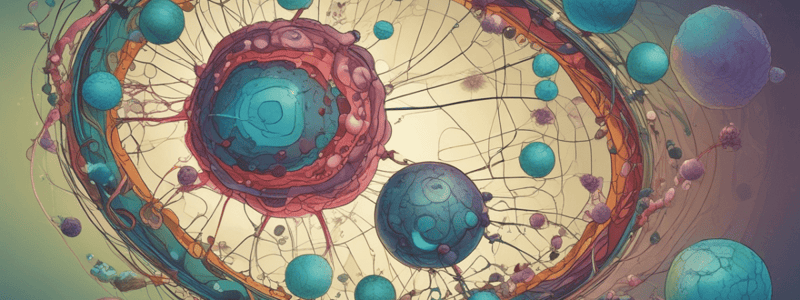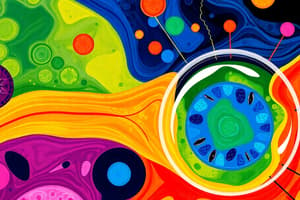Podcast
Questions and Answers
Who is referred to as the father of modern microbiology?
Who is referred to as the father of modern microbiology?
- A Dutch scientist from the 1800's
- Anton van Leeuwenhoek (correct)
- The inventor of the microscope
- Robert Hooke
What did Anton van Leeuwenhoek observe on his teeth?
What did Anton van Leeuwenhoek observe on his teeth?
- Fungi
- Animal-like creatures (correct)
- Dental plaque
- Plant cells
What was the name given to the small animal-like creatures observed by Anton van Leeuwenhoek?
What was the name given to the small animal-like creatures observed by Anton van Leeuwenhoek?
- Microbeasts
- Microorganisms
- Animacules (correct)
- Bacteria
When was the microscope invented?
When was the microscope invented?
Who else, besides Anton van Leeuwenhoek, looked at things under the microscope?
Who else, besides Anton van Leeuwenhoek, looked at things under the microscope?
What did Anton van Leeuwenhoek invent?
What did Anton van Leeuwenhoek invent?
What was Anton van Leeuwenhoek looking at when he discovered the animacules?
What was Anton van Leeuwenhoek looking at when he discovered the animacules?
What is the term used to describe the small animal-like creatures that Anton van Leeuwenhoek discovered?
What is the term used to describe the small animal-like creatures that Anton van Leeuwenhoek discovered?
What was Robert Hooke inspired to do after being hit on the head with a champagne cork?
What was Robert Hooke inspired to do after being hit on the head with a champagne cork?
What is the origin of the term 'cell' in biology?
What is the origin of the term 'cell' in biology?
What did scientists discover about bacteria despite their varying shapes?
What did scientists discover about bacteria despite their varying shapes?
Who was the German botanist who discovered that all plants have the same microscopic structure?
Who was the German botanist who discovered that all plants have the same microscopic structure?
What was the outcome of the dinner party conversation between Schleiden and Schwann?
What was the outcome of the dinner party conversation between Schleiden and Schwann?
What was the theory that suggested living organisms could arise from non-living matter?
What was the theory that suggested living organisms could arise from non-living matter?
What was the significance of Schwann's book published in 1838?
What was the significance of Schwann's book published in 1838?
What was the observation that led to the acceptance that animals come from animals and plants come from plants?
What was the observation that led to the acceptance that animals come from animals and plants come from plants?
What was the main question that scientists still had about cells despite the development of cell theory?
What was the main question that scientists still had about cells despite the development of cell theory?
What was the significance of Robert Hooke's observation of cork cells?
What was the significance of Robert Hooke's observation of cork cells?
Who is credited with the phrase 'Omnis cellula e cellula'?
Who is credited with the phrase 'Omnis cellula e cellula'?
What is the process by which bacteria reproduce?
What is the process by which bacteria reproduce?
What was the main objective of Louis Pasteur's Swan-Neck Bottle experiment?
What was the main objective of Louis Pasteur's Swan-Neck Bottle experiment?
Who is credited with refuting the theory of Abiogenesis in the late 1800s?
Who is credited with refuting the theory of Abiogenesis in the late 1800s?
What is Abiogenesis?
What is Abiogenesis?
What was the flaw in the experiment used by proponents of Abiogenesis?
What was the flaw in the experiment used by proponents of Abiogenesis?
Who is the Polish physiologist who likely originated the idea of binary fission?
Who is the Polish physiologist who likely originated the idea of binary fission?
What is the significance of the Swan-Neck Bottle experiment?
What is the significance of the Swan-Neck Bottle experiment?
What was the criticism faced by Rudolph Virchow's theory of cellular reproduction?
What was the criticism faced by Rudolph Virchow's theory of cellular reproduction?
Who is the ancient Greek philosopher associated with the theory of Abiogenesis?
Who is the ancient Greek philosopher associated with the theory of Abiogenesis?
What was the primary purpose of creating the swan-neck in the experiment?
What was the primary purpose of creating the swan-neck in the experiment?
What was the significance of the experiment with the swan-neck in regards to cell theory?
What was the significance of the experiment with the swan-neck in regards to cell theory?
What is the foundation of much of modern biology?
What is the foundation of much of modern biology?
What is a fundamental characteristic of life, according to cell theory?
What is a fundamental characteristic of life, according to cell theory?
What is the basic unit of structure in life, according to cell theory?
What is the basic unit of structure in life, according to cell theory?
Flashcards are hidden until you start studying
Study Notes
Development of Cell Theory
- Anton van Leeuwenhoek, a Dutch scientist, is considered the father of modern microbiology for his discovery of microorganisms (bacteria) using a microscope in the 1600s.
- He observed "animacules" (bacteria) in dental scrapings, which led to the discovery of microorganisms.
Discovery of Cells
- Robert Hooke, an English scientist, discovered cells by observing a cork under a microscope and observing the cell structure.
- He named them "cells" because the cell structure resembled little rooms (cellula in Latin) in a monastery.
First Tenet of Cell Theory
- The first tenet of cell theory states that the cell is the basic unit of structure in life.
- This was developed through observations of bacteria, plants, and animals, which all have cells as their basic structure.
Contributions of Matthias Schleiden and Theodor Schwann
- Matthias Schleiden, a German botanist, observed that all plants have the same microscopic structure (cells) in the 1830s.
- Theodor Schwann, a German scientist, observed that all animals have the same microscopic structure (cells) in the 1830s.
- They concluded that all living organisms are composed of cells, which is the second tenet of cell theory.
Third Tenet of Cell Theory
- The third tenet of cell theory states that all cells come from preexisting cells.
- This was developed through the work of Rudolph Virchow, who observed that cells divide and reproduce, and Louis Pasteur, who disproved the theory of Abiogenesis through his Swan-Neck Bottle experiment.
Refutation of Abiogenesis
- Abiogenesis is the theory that life can arise from non-living matter spontaneously.
- Louis Pasteur's Swan-Neck Bottle experiment showed that microorganisms in the air can contaminate a sterilized broth, disproving Abiogenesis.
- This experiment established the third tenet of cell theory, that all cells come from preexisting cells.
Studying That Suits You
Use AI to generate personalized quizzes and flashcards to suit your learning preferences.




